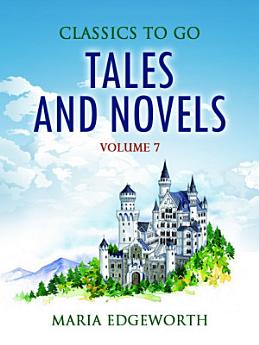Tales and Novels — Volume 7
Apr 2018 · CLASSICS TO GO · Otbebookpublishing
Ebook
451
Pages
family_home
Eligible
info
reportRatings and reviews aren’t verified Learn More
About this ebook
Excerpt: "How the wind is rising!" said Rosamond.—"God help the poor people at sea to-night!" Her brother Godfrey smiled.—"One would think," said he, "that she had an argosy of lovers at sea, uninsured." "You gentlemen," replied Rosamond, "imagine that ladies are always thinking of lovers." "Not always," said Godfrey; "only when they show themselves particularly disposed to humanity." "My humanity, on the present occasion, cannot even be suspected," said Rosamond; "for you know, alas! that I have no lover at sea or land."
About the author
Maria Edgeworth (1768-1849) was a pioneering Anglo-Irish writer whose works bridged the gap between 18th-century Enlightenment ideals and 19th-century Romanticism. Born in Oxfordshire, England, and later moving to Ireland, Edgeworth was deeply influenced by her father, Richard Lovell Edgeworth, an inventor and educational reformer. Her upbringing in a progressive household imbued her with a keen interest in social issues, education, and gender equality, themes that permeate her extensive body of work.Edgeworth's novels and stories are celebrated for their vivid characterizations and incisive social commentary. She was a trailblazer in children's literature, with works like "The Parent's Assistant" setting new standards for the genre. Her adult fiction, including "Castle Rackrent" and "Belinda," tackled complex issues such as class disparity, colonialism, and women's rights, making her one of the first novelists to address these topics with nuance and empathy.Her influence extended to contemporaries and later writers, including Sir Walter Scott, who credited her with inspiring his own historical novels. Despite her acclaim, Edgeworth was not without controversy; her depictions of Irish life and characters were sometimes criticized for perpetuating stereotypes, reflecting the complexities of her Anglo-Irish identity.Maria Edgeworth's legacy endures as a writer who not only entertained but also provoked thought and debate, challenging her readers to reconsider their views on society and morality. Her innovative spirit and commitment to social progress continue to resonate, making her a figure of enduring relevance in literary history.
Rate this ebook
Tell us what you think.
Reading information
Smartphones and tablets
Install the Google Play Books app for Android and iPad/iPhone. It syncs automatically with your account and allows you to read online or offline wherever you are.
Laptops and computers
You can listen to audiobooks purchased on Google Play using your computer's web browser.
eReaders and other devices
To read on e-ink devices like Kobo eReaders, you'll need to download a file and transfer it to your device. Follow the detailed Help Center instructions to transfer the files to supported eReaders.







